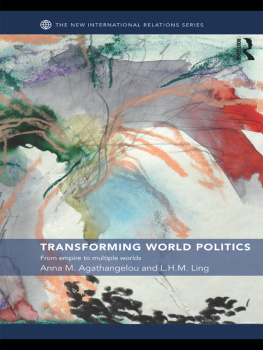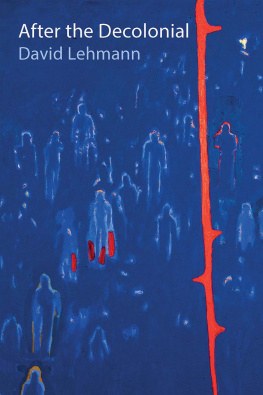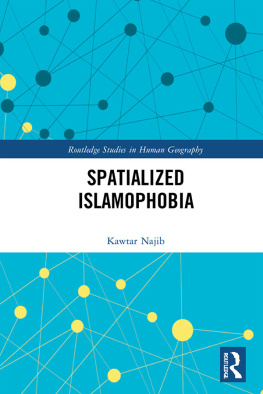David Tyrer - The Politics of Islamophobia: Race, Power and Fantasy (Decolonial Studies, Postcolonial Horizons)
Here you can read online David Tyrer - The Politics of Islamophobia: Race, Power and Fantasy (Decolonial Studies, Postcolonial Horizons) full text of the book (entire story) in english for free. Download pdf and epub, get meaning, cover and reviews about this ebook. year: 2013, publisher: Pluto Press, genre: Politics. Description of the work, (preface) as well as reviews are available. Best literature library LitArk.com created for fans of good reading and offers a wide selection of genres:
Romance novel
Science fiction
Adventure
Detective
Science
History
Home and family
Prose
Art
Politics
Computer
Non-fiction
Religion
Business
Children
Humor
Choose a favorite category and find really read worthwhile books. Enjoy immersion in the world of imagination, feel the emotions of the characters or learn something new for yourself, make an fascinating discovery.
- Book:The Politics of Islamophobia: Race, Power and Fantasy (Decolonial Studies, Postcolonial Horizons)
- Author:
- Publisher:Pluto Press
- Genre:
- Year:2013
- Rating:3 / 5
- Favourites:Add to favourites
- Your mark:
- 60
- 1
- 2
- 3
- 4
- 5
The Politics of Islamophobia: Race, Power and Fantasy (Decolonial Studies, Postcolonial Horizons): summary, description and annotation
We offer to read an annotation, description, summary or preface (depends on what the author of the book "The Politics of Islamophobia: Race, Power and Fantasy (Decolonial Studies, Postcolonial Horizons)" wrote himself). If you haven't found the necessary information about the book — write in the comments, we will try to find it.
David Tyrer: author's other books
Who wrote The Politics of Islamophobia: Race, Power and Fantasy (Decolonial Studies, Postcolonial Horizons)? Find out the surname, the name of the author of the book and a list of all author's works by series.
The Politics of Islamophobia: Race, Power and Fantasy (Decolonial Studies, Postcolonial Horizons) — read online for free the complete book (whole text) full work
Below is the text of the book, divided by pages. System saving the place of the last page read, allows you to conveniently read the book "The Politics of Islamophobia: Race, Power and Fantasy (Decolonial Studies, Postcolonial Horizons)" online for free, without having to search again every time where you left off. Put a bookmark, and you can go to the page where you finished reading at any time.
Font size:
Interval:
Bookmark:
The Politics of Islamophobia
Decolonial Studies, Postcolonial Horizons
Series editors: Ramn Grosfoguel (University of California at Berkeley), Barnor Hesse (Northwestern University) and S. Sayyid (University of Leeds)
Since the end of the Cold War, unresolved conjunctures and crises of race, ethnicity, religion, diversity, diaspora, globalization, the West and the non-West, have radically projected the meaning of the political and the cultural beyond the traditional verities of Left and Right. Throughout this period, Western developments in international relations have become increasingly defined as corollaries to national race relations across both the European Union and the United States, where the reformation of Western imperial discourses and practices have been given particular impetus by the war against terror. At the same time hegemonic Western continuities of racial profiling and colonial innovations have attested to the incomplete and interrupted institutions of the postcolonial era. Today we are witnessing renewed critiques of these postcolonial horizons at the threshold of attempts to inaugurate the political and cultural forms that decolonization now needs to take within and between the West and the non-West. This series explores and discusses radical ideas that open up and advance understandings of these politically multicultural issues and theoretically interdisciplinary questions.
Also available
Rewriting Exodus
American Futures from Du Bois to Obama
Anna Hartnell
The Dutch Atlantic
Slavery, Abolition and Emancipation
Kwame Nimako and Glenn Willemsen
Islam and the Political
Theory, Governance and International Relations
Amr G.E. Sabet

First published 2013 by Pluto Press
345 Archway Road, London N6 5AA
www.plutobooks.com
Distributed in the United States of America exclusively by Palgrave Macmillan, a division of St. Martins Press LLC, 175 Fifth Avenue, New York, NY 10010
Copyright David Tyrer 2013
The right of David Tyrer to be identified as the author of this work has been asserted by him in accordance with the Copyright, Designs and Patents Act 1988.
British Library Cataloguing in Publication Data
A catalogue record for this book is available from the British Library
ISBN 978 0 7453 3132 4 Hardback
ISBN 978 0 7453 3131 7 Paperback
ISBN 978 1 8496 4873 8 PDF eBook
ISBN 978 1 8496 4875 2 Kindle eBook
ISBN 978 1 8496 4874 5 EPUB eBook
Library of Congress Cataloging in Publication Data applied for
This book is printed on paper suitable for recycling and made from fully managed and sustained forest sources. Logging, pulping and manufacturing processes are expected to conform to the environmental standards of the country of origin.
10 9 8 7 6 5 4 3 2 1
Typeset from disk by Stanford DTP Services, Northampton, England
Text design by Melanie Patrick
Simultaneously printed digitally by CPI Antony Rowe, Chippenham, UK and
Edwards Bros in the United States of America
I fy rhieni: diolch am bopeth
Fear is a bad advisor. Its companion is hate.
Aneurin Bevan
In Breakfast at Tiffanys there is a scene in which, by way of explaining that writing is a slow process, Paul Varjak tells Holly Golightly, Well, the idea is Im not supposed to fritter my talent on little things. Im supposed to be saving it for the big one. Those of us who lack the talent (and style) to waste or save just have to make do with what weve got and it makes a huge difference to have the support of an excellent editorial team. I therefore thank David Castle, Jonathan Maunder, Robert Webb and all at Pluto Press for their incredible support and advice, and Thrse Wassily Saba for her expert copy-editing. I also wish to express gratitude to the series editors, Ramn Grosfoguel, Barnor Hesse and Professor S. Sayyid. I wish to thank Ian Law for reviewing the manuscript.
I am also indebted to a great many others who have in various ways contributed to my experience of writing this book. Katherine Harbord: thank you for the politics and the Politics, and for medicinal diversions over in HQ after a hard days teaching that you invariably made more enjoyable and stimulating. Gillian OBrien: thank you for all the wisdom and intellectual stimulation you have shared, not to mention the odd bottle of Connemara Peated and the joys of ICSN. Rob Jones: thanks, mate! Gilda: I put the blame on Mame (Rita Hayworth says so), but thank you (teas, tattoos, proof-reading ...). Mike Benbough-Jackson: diolch yn fawr. The girl with the dragon tattoo: diolch yn fawr. Katy Pal Sian: I owe you an especially big thank you for everything. It would be remiss not to mention the infectious enthusiasm of Emily and John for bamboozling me with Aristotle and Anoximander, running, and tales of Paris life. When things got lost in translation, Amal Sheiko was a great help dank je wel. A number of other people provided much needed moments of escape along the way that kept me fresh: you all know who you are, but thank you from the bottom of my heart. I need to thank colleagues at Liverpool John Moores University including Liz Sperling, to whom I am especially indebted, Helen Churchill, Joe Yates, Lucie Mathews-Jones, Lucinda Thompson, the history boys and all in HSS. Professors Nick White, Joe Sim, Steve Tombs, and Joe Moran always inspire those around them to retain their faith in academia and I am grateful for their support and encouragement. I wish to thank Amrit for friendship and intellectual generosity during the development of this project. Michaela: go raibh mile maith agait (there I think I got it). Hussein Ali Agrama provided insightful comments as a discussant when some of these ideas were presented at a conference. I am also grateful to Frank Peter, Sarah Dornhof, Alexandre Caeiro, AbdoolKarim Vakil, Tina Patel, and Scott Poynting. Steve Lawler and Cheryl Connor put up with my analogue fascination for typewriters, old cameras and the obsolete, and kept me plugged into the matrix and on the straight and narrow (dammit), and for this I am grateful. I am indebted to the following people for providing hospitality and stimulating intellectual exchanges when they invited me to present at seminars and conferences: S. Sayyid, Shvetal Vyas, Gilbert Caluya, and Kam Kaur at the University of South Australia (who also published an early version of some of the themes in this book as an occasional paper); the organisers of the University of Salford Criminology Research Seminar Series; Tania Saeed and colleagues at St Antonys College Oxford; Nina-Clara Tiesler and colleagues at ICS at the University of Lisbon; Elena Arigita and colleagues at Casa Arabe e Instituto Internacional de Estudios Arabes y del Mundo Musulman in Cordoba; and Frank, Andreas and Colleagues at the University of Bern. I have enjoyed and benefited from the opportunity to test some of these ideas in the Blackboard Jungle and through supervision, and thank students for always speaking back and keeping the beat going. I should thank those who have ensured the spirit is willing even when the flesh is weak; here a number of hostelries spring to mind for their sterling work. My greatest debt of gratitude is to my family for putting up with me while writing this book.
David Tyrer
May 2013
All this happened, more or less
Kurt Vonnegut, Slaughterhouse Five
A s I write Lieutenant Columbo shuffles affably around the small screen, solving a murder in the movie industry in his own inimitable fashion. There is really no need to pay attention for it could be pretty much any one of sixty-nine different episodes which all hinge on similar logical devices in which befuddlement and harmless curiosity conceal what he
Next pageFont size:
Interval:
Bookmark:
Similar books «The Politics of Islamophobia: Race, Power and Fantasy (Decolonial Studies, Postcolonial Horizons)»
Look at similar books to The Politics of Islamophobia: Race, Power and Fantasy (Decolonial Studies, Postcolonial Horizons). We have selected literature similar in name and meaning in the hope of providing readers with more options to find new, interesting, not yet read works.
Discussion, reviews of the book The Politics of Islamophobia: Race, Power and Fantasy (Decolonial Studies, Postcolonial Horizons) and just readers' own opinions. Leave your comments, write what you think about the work, its meaning or the main characters. Specify what exactly you liked and what you didn't like, and why you think so.











